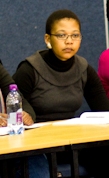
Debating the extent to which young South Africans are engaging with the complex political dynamics of contemporary society, several Rhodes University lecturers recently presented their views on the topic, “Teaching the Born Frees: The Dea(r)th of Youth Intellectualism in the Post-Apartheid University?”
Hosted by Women's Academic Solidarity Association (WASA) and chaired by Ms Siphokazi Magadla. The panel comprised Professor Jean Baxen, Dr Nomalanga Mkhize, Dr Sally Mathews, Ms Babalwa Magoqwana and Dr Carla Tsampiras.
They led the discussion with their views on the seemingly widely held opinion that South African youth are more apathetic now than ever.
Prof Baxen, from the Education Department, juxtaposed her experience of growing up on a remote farm in Mpumalanga and walking three miles to school each day, with the experience of her son, born a ‘born free’.
“I intuitively knew that my circumstances at the time would, could and should not dictate who I would become despite the political circumstances at the time,” said Prof Baxen, adding that her son had a very different upbringing in Cape Town and had been confronted with very different issues in post-apartheid South Africa.
Seeing her son through the complex encounters with race and politics in contemporary society has not been a simple journey and Prof Baxen believes education has a key role to play in encouraging young South Africans to engage with some of these complexities. “What is education for if it keeps creating discursive spaces that lead to ‘othering’ and inequality?” she asked.
Dr Matthews, lecturer in the Department of Political and International Studies, argued that while a common critique is that the contemporary classroom space is not adequately engaging with the complexities of the day and not recognising societal divisions, her experience of lecturing students for 10 years suggests the need for a more nuanced approach.
While the post-apartheid university has been labelled as a degendered, deracialised and declassed space compared to the highly politicised environment that prevailed during apartheid, Dr Matthews said this question is not a uniquely South African one but rather applies universally.
Society today is not as clearly polarised as it was during Apartheid and the Cold War, and “consequently we’re not sure who our enemies are. The lines along which we may organise have become less clear,” she said, noting a strong support of this in her experience of lecturing.
“On issues of race, gender and class, students’ positions regarding these complexities are more complicated than they were before. In their essays I see white students writing passionately about defeating Western powers, and black students being very critical of the ANC. The context is becoming more diverse and students are having opportunities to engage with people from different backgrounds and becoming more critical of the views they are exposed to,” Dr Matthews said.
Dr Mkhize, a History lecturer emphasised the far-reaching shifts that have occurred in South African politics since 1994, which she said make politics difficult to manage.
Dr Mkhize spoke of two kinds of youth that have emerged in this new political realm, including firstly a group of “middle class, self-important, narcissistic” individuals whose political engagements are driven by a hunger for fame.
The second group comprises youths who ascribe to youth mass populism as personified by ANC Youth League spokesperson Floyd Shivambu and members of the South African Students Congress (SASCO).
“This is why you can’t find progressive politics in South Africa. People are just interested in getting famous by being on Twitter and having 20 000 followers. We need something in between, a new language. Politics has to accommodate new things like climate change and unemployment,” she said, adding that her advice to students today is to “ditch the struggle and arguments about Marxism and neo-liberalism…and find a new way to be.”
Dr Tsampiras, also from the History Department, argued for a new approach to the question, urging that we avoid complaining too easily that students are not engaging with complexities.
“I’m tired of being told what we are not and what we lack in South Africa. If we look around there are people here who came out on a cold night to engage with these issues and let’s rather look at that,” she said.
The debate was inspired by a paper by Louise Vincent, Associate Professor in the Department of Political and International Studies at Rhodes University, entitled “What's love got to do with it? The effect of affect in the academy” (2004).
Prof Vincent argued that the presence of black students at Rhodes in the 1980s presented a dynamic classroom environment for students, with most black students experiencing their presence at the white institution as a counter hegemonic act.
Black students demanded that the classroom be opened up to be a space where education provided answers to the politics of the day, the marginalisation of the blacks and the privilege of the whites.
Prof Vincent goes on to argue that the end of apartheid for the university has, in many ways, seen the classroom being closed to these racialised, gendered and class contestations.
In this context the classroom has been deracialised, degendered and declassed resulting in “individualised, economised, depoliticised discourse” that “shifts thinking away from the possibility of social transformation”.
By Sarah-Jane Bradfield
